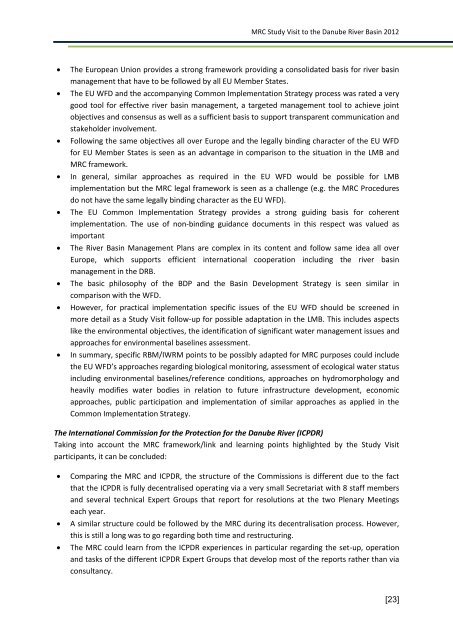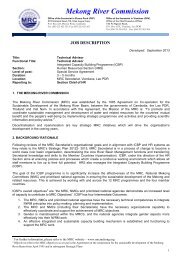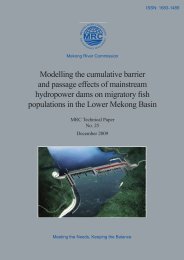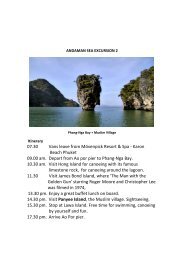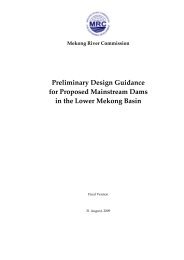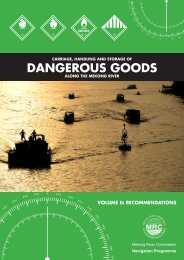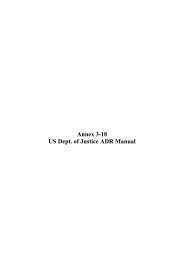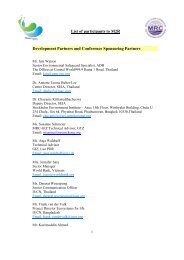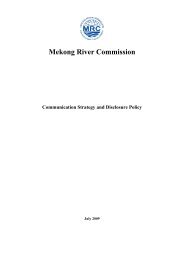evaluation of the study visit - Mekong River Commission
evaluation of the study visit - Mekong River Commission
evaluation of the study visit - Mekong River Commission
You also want an ePaper? Increase the reach of your titles
YUMPU automatically turns print PDFs into web optimized ePapers that Google loves.
MRC Study Visit to <strong>the</strong> Danube <strong>River</strong> Basin 2012<br />
� The European Union provides a strong framework providing a consolidated basis for river basin<br />
management that have to be followed by all EU Member States.<br />
� The EU WFD and <strong>the</strong> accompanying Common Implementation Strategy process was rated a very<br />
good tool for effective river basin management, a targeted management tool to achieve joint<br />
objectives and consensus as well as a sufficient basis to support transparent communication and<br />
stakeholder involvement.<br />
� Following <strong>the</strong> same objectives all over Europe and <strong>the</strong> legally binding character <strong>of</strong> <strong>the</strong> EU WFD<br />
for EU Member States is seen as an advantage in comparison to <strong>the</strong> situation in <strong>the</strong> LMB and<br />
MRC framework.<br />
� In general, similar approaches as required in <strong>the</strong> EU WFD would be possible for LMB<br />
implementation but <strong>the</strong> MRC legal framework is seen as a challenge (e.g. <strong>the</strong> MRC Procedures<br />
do not have <strong>the</strong> same legally binding character as <strong>the</strong> EU WFD).<br />
� The EU Common Implementation Strategy provides a strong guiding basis for coherent<br />
implementation. The use <strong>of</strong> non-binding guidance documents in this respect was valued as<br />
important<br />
� The <strong>River</strong> Basin Management Plans are complex in its content and follow same idea all over<br />
Europe, which supports efficient international cooperation including <strong>the</strong> river basin<br />
management in <strong>the</strong> DRB.<br />
� The basic philosophy <strong>of</strong> <strong>the</strong> BDP and <strong>the</strong> Basin Development Strategy is seen similar in<br />
comparison with <strong>the</strong> WFD.<br />
� However, for practical implementation specific issues <strong>of</strong> <strong>the</strong> EU WFD should be screened in<br />
more detail as a Study Visit follow-up for possible adaptation in <strong>the</strong> LMB. This includes aspects<br />
like <strong>the</strong> environmental objectives, <strong>the</strong> identification <strong>of</strong> significant water management issues and<br />
approaches for environmental baselines assessment.<br />
� In summary, specific RBM/IWRM points to be possibly adapted for MRC purposes could include<br />
<strong>the</strong> EU WFD’s approaches regarding biological monitoring, assessment <strong>of</strong> ecological water status<br />
including environmental baselines/reference conditions, approaches on hydromorphology and<br />
heavily modifies water bodies in relation to future infrastructure development, economic<br />
approaches, public participation and implementation <strong>of</strong> similar approaches as applied in <strong>the</strong><br />
Common Implementation Strategy.<br />
The International <strong>Commission</strong> for <strong>the</strong> Protection for <strong>the</strong> Danube <strong>River</strong> (ICPDR)<br />
Taking into account <strong>the</strong> MRC framework/link and learning points highlighted by <strong>the</strong> Study Visit<br />
participants, it can be concluded:<br />
� Comparing <strong>the</strong> MRC and ICPDR, <strong>the</strong> structure <strong>of</strong> <strong>the</strong> <strong>Commission</strong>s is different due to <strong>the</strong> fact<br />
that <strong>the</strong> ICPDR is fully decentralised operating via a very small Secretariat with 8 staff members<br />
and several technical Expert Groups that report for resolutions at <strong>the</strong> two Plenary Meetings<br />
each year.<br />
� A similar structure could be followed by <strong>the</strong> MRC during its decentralisation process. However,<br />
this is still a long was to go regarding both time and restructuring.<br />
� The MRC could learn from <strong>the</strong> ICPDR experiences in particular regarding <strong>the</strong> set-up, operation<br />
and tasks <strong>of</strong> <strong>the</strong> different ICPDR Expert Groups that develop most <strong>of</strong> <strong>the</strong> reports ra<strong>the</strong>r than via<br />
consultancy.<br />
[23]


